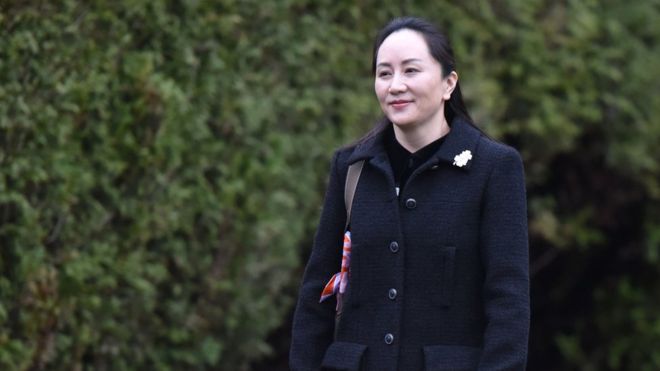A courthouse in Vancouver, Canada has begun the hearing of Chinese tech company Huawei’s CFO Meng Wanzhou 47, who has been placed under house arrest for several months following her arrest at a Vancouver airport in 2018.
The US wants Ms Meng to stand trial for charges of fraud in helping Huawei to bypass US trade sanctions against Iran.
Meng, the daughter of Huawei’s founder Ren Zhengfei has denied any wrongdoing.
Several calls have been publicly made by the Chinese government on their Canadian counterparts for the release of Ms Meng but with the US requesting extradition, the Canadian government refused to back down and promised to see through the extradition process till the end.
“This is entirely a serious political incident that grossly violates the legitimate rights and interests of the Chinese citizen,” Chinese foreign ministry spokesperson Geng Shuang said.
Meanwhile, Huawei said it stood by its executive “in her pursuit of justice and freedom.”
In a video circulated through its social media platforms as the hearing got underway, Huawei said it trusted in Canada’s judicial system “which will prove Ms Meng’s innocence”.
This first phase of hearings is scheduled to run from 20-24 January in the British Columbia supreme court in Vancouver.
The court will hear arguments on whether the crime Ms Meng is accused of by the US would also be considered a crime in Canada.
The onus is on the prosecuting counsel(s) to prove that the allegations meet the so-called “double criminality” test before the Judge can agree to an extradition.
Shortly after her arrest, China detained two Canadian nationals – Michael Kovrig, a former diplomat, and Michael Spavor, a businessman – and has accused the pair of espionage. The move was widely viewed as “hostage diplomacy” a tactics to put pressure on the Canadian government.
The Pentagon has been lobbying its allies – including the UK – to not use Huawei’s 5G technology services in critical communications infrastructure, alleging it could be a security threat.
How the extradition process works
According to BBC News;
If a judge is satisfied with the evidence presented, he or she will authorise that the individual be committed for extradition.
If not, the accused will be discharged and released from custody.
Even if the judge recommends extradition, it is the federal justice minister who makes the ultimate decision.
A second phase, focusing on allegations of abuse of process and whether Canadian officials followed the law while arresting Ms Meng, is due to be heard in June.
It is highly likely the overall process could be lengthy. Ms Meng has avenues to appeal throughout the process.



Leave a Reply